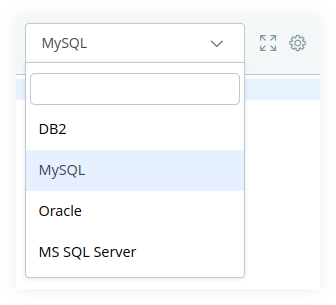Basic HackerRank SQL Challenges¶
Intro¶
Unless otherwise noted, assume these examples where tested on MySQL and MySQL CLI. I prefer MariaDB and PostgreSQL by it seems HackerRank does not provide any of those (as of June 18, 2023 at least).
Also, we’ll try to stick to standard-compliant (and shy away from vendor-specific features and syntax) SQL whenever possible for max portability.
Note
RackerRank SQL challenges come in three main levels of difficulty:
Basic
Intermediate
Advanced
This page deals with the basic ones.

Revising The Select Query I¶
SELECT
id
, name
, countrycode
, district
, population
FROM city
WHERE population >= 100000
AND countrycode = 'USA';
We can replace all column names with the star *, but this is more readable as all column names are explicitly stated in the query.
Also, we could use LIKE in place of = for this case: … AND countrycode LIKE 'USA'.
Revising the Select Query II¶
SELECT name
FROM city
WHERE population > 120000
AND countrycode LIKE 'USA';
Select All¶
SELECT
id
, name
, countrycode
, district
, population
FROM city;
Again, writing the column names explicitly makes it more self-documenting than simply using *.
Select By ID¶
SELECT
id
, name
, countrycode
, district
, population
FROM city
WHERE id = 1661;
Japanese Cities’ Attributes¶
SELECT name
FROM city
WHERE countrycode = 'JPN';
Weather Observation Station 1¶
SELECT
city
, state
FROM station;
Weather Observation Station 2¶
SELECT
ROUND(SUM(lat_n), 2) AS lat
, ROUND(SUM(long_w), 2) AS lon
FROM station;
So we basically round the result of the sum and rename the output columns as lat and lon.
We can SUM any numeric column, e.g.:
SELECT SUM(id) FROM users;
And also ROUND(value, num_decimal_places), e.g.:
mydb=# SELECT ROUND(3.141592653589793, 5) AS my_pi;
my_pi
---------
3.14159
Weather Observation Station 3¶
SELECT DISTINCT city
FROM station
WHERE id % 2 = 0;
We just SELECT DISTINCT to avoid duplicates.
For the “even IDs”, the old, battle-tested tested integer division compared with 0 does the trick. It seems % has higher precedence than =, but we could wrap the remainder division in parentheses too if we wanted to make sure or make it more explicit/clear:
SELECT DISTINCT city
FROM station
WHERE (id % 2) = 0;
Weather Observation Station 4¶
SELECT (COUNT(city) - COUNT(DISTINCT city)) AS count
FROM station;
Looks like they consider only the city name (city) column to determine if the city is the same or not.
COUNT(city) returns some number, and COUNT(DISTINCT city) can potentially return another number, which we subtract from the first, producing the correct result expected by the challenge.
Note we didn’t call DISTINCT as a function, with parentheses, like DISTINCT(city).
Assume this table and data:
CREATE TABLE users (
id INTEGER PRIMARY KEY
, name VARCHAR(128) NOT NULL
);
INSERT INTO users (
id
, name
) VALUES
(1, 'Yoda')
, (2, 'Ahsoka tano')
, (3, 'Aayla Secura')
, (4, 'Leia')
, (5, 'Leia');
Then see how it is possible to use both DISTINCT name or DISTINCT(name) inside COUNT():
> SELECT id, name FROM users;
id | name
----+--------------
1 | Yoda
2 | Ahsoka tano
3 | Aayla Secura
4 | Leia
5 | Leia
(5 rows)
> SELECT COUNT(name) FROM users;
count
-------
5
(1 row)
parentheses
--------------
> SELECT COUNT(DISTINCT(name)) FROM users;
count
-------
4
(1 row)
no parentheses
-------------
> SELECT COUNT(DISTINCT name) FROM users;
count
-------
4
(1 row)
parentheses
--------------
> SELECT (COUNT(name) - COUNT(DISTINCT(name))) AS count FROM users;
count
-------
1
(1 row)
no parentheses
-------------
> SELECT (COUNT(name) - COUNT(DISTINCT name)) AS count FROM users;
count
-------
1
(1 row)
I tested this on both PostgreSQL and MariaDB and both vendors accept both syntaxes.
Weather Observation Station 6¶
Works on DB vendors whose collation allows case insensitive matches:
SELECT DISTINCT city
FROM station
WHERE
city LIKE 'a%'
OR city LIKE 'e%'
OR city LIKE 'i%'
OR city LIKE 'o%'
OR city LIKE 'u%';
This approach extracts the first char of the title column and uses IN to compare.
It relies on the fact that cities start with an uppercase letter:
SELECT DISTINCT title
FROM entries
WHERE
SUBSTR(title, 1, 1)
IN('A', 'E', 'I', 'O', 'U');
And this one, similar to the above, just lowercases the first char of the title before doing the comparison:
SELECT DISTINCT title
FROM entries
WHERE
LOWER(SUBSTR(title, 1, 1))
IN('a', 'e', 'i', 'o', 'u');
Weather Observation Station 5¶
UNION ALL of two queries¶
One approach is to use two queries: one for the city name length, and another one for the min city name length, limit by 1, and union the results to create a single resulting tabular structure:
(SELECT
city
, LENGTH(city) AS len_city
FROM station
ORDER BY len_city ASC, city DESC
LIMIT 1)
UNION ALL
(SELECT
city
, LENGTH(city) AS len_city
FROM station
ORDER BY len_city DESC, city DESC
LIMIT 1);
WHERE IN union of subquery¶
Or creating a sub-table to select the lengths from.
First, select the max and min lengths:
SELECT MAX(LENGTH(city)) FROM station
UNION ALL
SELECT MIN(LENGTH(city)) FROM station;
It returns a tabular structures with the max and min lengths, which can be used in a WHEER/IN clause:
SELECT
city
, LENGTH(city)
FROM station
WHERE LENGTH(city) IN (
SELECT MAX(LENGTH(city)) FROM station
UNION ALL
SELECT MIN(LENGTH(city)) FROM station
)
ORDER BY LENGTH(city) DESC, city;